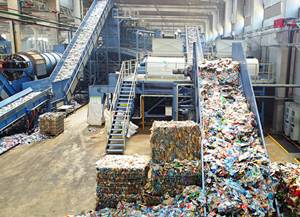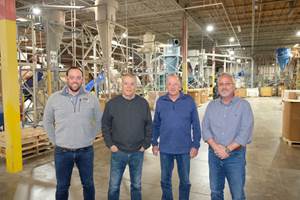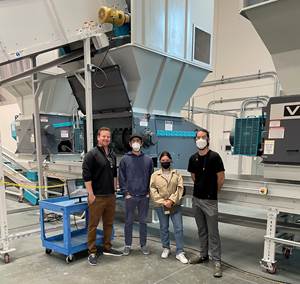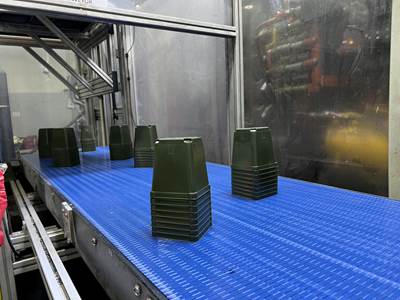A Vinyl Record Business Grows in Brooklyn
In 2001, when Thomas Bernich started Brooklynphono, a private-label LP record pressing company in Brooklyn, N.Y., he bought used equipment from record companies that were going out of business, even despite strong sales growth.
In 2001, when Thomas Bernich started Brooklynphono, a private-label LP record pressing company in Brooklyn, N.Y., he bought used equipment from record companies that were going out of business, even despite strong sales growth. So the lesson he learned going in was that survival would depend on efficiency and cost control, not just on being busy.
Bernick, a former art student, bought seven used record presses, some just for the hydraulics and spare parts. He had five presses completely rebuilt and the platens realigned by Clifton Fluid Power in Clifton, N.J. He also bought used extruders and had new barrels and custom screws installed in them by STC Equipment in Wayne, N.J. He trolled Ebay for ancillary equipment.
In late 2002, Bernich moved the equipment into a rented building and started stamping records. LPs are made by extruding a specially formulated PVC into a doughnut-shaped mold with a spindle in the middle. The spindle moves the doughnut from the forming station into the press, where two plates impress the sound grooves into the soft plastic to form the record. Once the record is formed, it’s trimmed and tipped onto a stack of other records to cool.
CLEAN SCRAP IS ESSENTIAL
Initially Bernich’s reject rate for records was as high as 65%. The problem was metal slivers in the PVC regrind, byproducts of grinding LP edge trim in a granulator he had bought as used equipment. Even the smallest bit of metal, when dragged across a 1- to 5-mil sound groove during stamping, ruins the record.
An acquaintance at an injection molding company put Bernich in touch with Hosokawa Polymer Systems in Berlin, Conn., which custom modified a granulator with much tighter than normal tolerances. Polymer Systems reduced the granulators’ feed-auger clearances down to 1/16 in. from the usual 5/16 in., while still ensuring there was no metal-to-metal contact. Nowadays, regrind from this special granulator runs better in his extruders than virgin polymer, Bernich says. His reject rate dropped below 10%. “Our goal is 3% to 5%,” he says.
Edge trim, which weighs about 37 grams per record, was initially fed by hand to a granulator, as is typical in this business. But Bernich switched to small auger-fed granulators with 8 x 8 in. cutting chambers to grind edge trim automatically at each press. He believes that Brooklynphono is the only vinyl record company that processes its scrap in a closed loop at the press.
LP record scrap also includes defective doughnuts and whole records, which are ground off-line in a larger (11 x 16 in.), soundproof Polymer Systems granulator.
TINKER ’TIL IT’S PERFECT
Bernich races around his 6250-sq-ft plant with frenetic energy, taking over from either of two machine operators the moment he hears a press make a sound he doesn’t like. His employees put up with his mechanical interference graciously. One handles three presses at once; the other takes care of QC; and they trade off. They also answer phones and take record orders.
Bernich is gifted at listening to machinery. He acquired a lot of practical machine building skills from his father, who was a mechanic and machinist with a basement full of lathes and milling machines.
Bernich’s passion is constantly improving automation and machine efficiency. The presses came with motorized cutting knives that rotate on their axis while they circle around the record. Bernich removed the rotational motors on the cutters, which he says weren’t necessary and only added weight to the cutter platen. He also removed the cooling fans from the extruders because he found they weren’t necessary either. “The extruders have just enough shear to maintain ideal temperature,” he notes. He improved temperature profiling in the record molds for faster cycle times.
Related Content
Hot Wash Systems for Recycling Polyolefins
Herbold can configure wash plants for polyolefins that can produce high-quality, food-grade recyclates.
Read MoreClothing Reseller Finds Recycling Pathway
A partnership between ThredUp and Azek will recycle clothing bags to composite deck products.
Read MoreEvolving Opportunities for Ambitious Plastics Recycler
St. Joseph Plastics grew from a simple grinding operation and now pursues growing markets in recycled PP, food-grade recycled materials, and customized post-industrial and post-consumer compounds.
Read MoreVecoplan Opens New Location in Southern California
The company’s new office will allow the company to more effectively service customers in the country’s western region.
Read MoreRead Next
Processor Turns to AI to Help Keep Machines Humming
At captive processor McConkey, a new generation of artificial intelligence models, highlighted by ChatGPT, is helping it wade through the shortage of skilled labor and keep its production lines churning out good parts.
Read MoreAdvanced Recycling: Beyond Pyrolysis
Consumer-product brand owners increasingly see advanced chemical recycling as a necessary complement to mechanical recycling if they are to meet ambitious goals for a circular economy in the next decade. Dozens of technology providers are developing new technologies to overcome the limitations of existing pyrolysis methods and to commercialize various alternative approaches to chemical recycling of plastics.
Read MorePeople 4.0 – How to Get Buy-In from Your Staff for Industry 4.0 Systems
Implementing a production monitoring system as the foundation of a ‘smart factory’ is about integrating people with new technology as much as it is about integrating machines and computers. Here are tips from a company that has gone through the process.
Read More














.png;maxWidth=300;quality=90)










